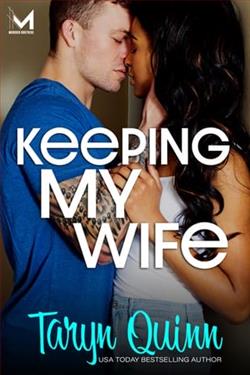Page 75 of Duke of Myste
She had to. Because he was only just beginning to understand what it meant to love someone completely, and he refused to accept that their story might end before it had truly begun.
CHAPTER 23
“You are being entirely and completely unreasonable,” Harriet said, her voice tight with sisterly exasperation. “Your hovering isn’t helping her recover—it’s simply making you ill!”
“I am not hovering,” Richard insisted, though his defensive tone suggested otherwise.
He had never understood the true meaning of helplessness until that moment.
He sat in the uncomfortable chair he had dragged beside Jane’s bed thirty-six hours ago, his body aching from the awkward position, his eyes burning from lack of proper sleep, yet he found himself utterly unable to contemplate being anywhere else.
The steady rise and fall of Jane’s chest had become his entire world—each breath a small victory, each peaceful moment of sleep a gift he dared not take for granted.
Dr. Whitmore had assured him that Jane’s pulse was strong and her breathing was steady, and that head injuries often required extended periods of unconsciousness for proper healing.
But the physician’s clinical confidence did nothing to ease the terror that had taken up permanent residence in Richard’s chest—a cold, gnawing fear that whispered of all the ways this could still go horribly wrong.
“Richard.” Harriet’s voice came from the doorway, soft but carrying the particular tone she used when she was about to say something he wouldn’t want to hear. “You need to eat.”
Richard didn’t look away from Jane’s sleeping form. “I am not hungry.”
“That is not relevant to the requirement that you consume food,” Harriet replied, entering the room with the determined stride of a woman on a mission. “You haven’t had a proper meal since we brought Jane home. If you collapse from malnutrition, you will be no good to her at all.”
“I ate yesterday,” Richard protested. Though even as he said it, he could not quite remember what he had eaten or when.
“Three tiny bites of toast and half a cup of tea do not constitute eating,” Harriet said firmly, setting a tray on the side table with more force than strictly necessary. “Richard, look at me.”
Reluctantly, Richard tore his gaze away from Jane’s face to meet his sister’s concerned eyes. Harriet’s expression immediately shifted from exasperation to something closer to alarm.
“Good heavens, you look terrible,” she breathed. “When did you last see yourself in a mirror?”
Richard glanced down at his appearance with mild surprise. His shirt was wrinkled beyond repair, his cravat had disappeared sometime during the night, and he was fairly certain he had forgotten to shave that morning. Or possibly the morning before that.
“Appearances seem rather trivial at present,” he said, returning his attention to his wife.
“Richard.” Harriet moved closer, her voice softening. “She is going to be all right. The physician was very clear about that. Her injury, while serious, shows no signs of complications. She simply needs time to heal.”
“Physicians do not always know everything.” The words emerged more sharply than intended. “Head injuries are unpredictable. If she wakes up, she could have no memory of who I am, or who she is, or?—”
“Whenshe wakes up,” Harriet corrected him gently. “Or she could wake up exactly as she was before the accident,” she countered. “Richard, you’re torturing yourself with scenarios that may never come to pass.”
Richard’s hands clenched into fists in his lap. “I cannot lose her, Harriet. I know that sounds dramatic, but I mean it—literally. I will not survive losing Jane. Not now, not when I have finally understood what it means to love someone completely.”
The raw honesty in his voice seemed to give Harriet pause. She studied his face with the keen attention she had always applied to situations that required delicate handling.
“Tell me,” she said quietly, settling into the small chair near the window. “When did you realize you loved her?”
Richard considered her question, his gaze returning to Jane’s peaceful features. “I don’t think there was a single moment of clear realization. It was more… like gradually becoming aware that she had become essential to my very existence. That every day was better because she was in it, every conversation more interesting because she was a part of it.”
“And when did you tell her?”
“At Vauxhall.” A ghost of a smile touched Richard’s lips at the memory. “During that ridiculous waltz that scandalized half of London. I told her she was my soulmate, my destined partner. She looked so surprised, as though the idea that I might love her was shocking somehow.”
“Perhaps because you spent the first days of your marriage giving her every indication that you preferred emotional distance,” Harriet observed with gentle honesty.
Richard winced. “I was protecting myself. Or trying to. Love makes you vulnerable in ways you aren’t quite prepared for. Every time Jane smiled at me, every time she challenged my opinions or showed interest in me, I felt myself becoming more attached, more dependent on her happiness for my own.”
“And that frightened you?”















